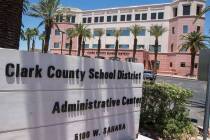Sandoval proposal spurs school district debt fears
Homeowners facing loan default: Move over.
The Clark County School District might be joining the ranks of those unable to make their monthly payments if legislators accept the governor's proposal to divert state school systems' capital reserves to their operating budgets.
For 2011-12, the district -- once the fastest-growing in the nation -- anticipates paying $551 million in principal and interest on its bond debt while tax revenues are expected to generate
$413 million.
"Our mortgage is more than our income," said Jeff Weiler, the district's chief financial officer.
That is where capital reserves would normally come into play. Because tax revenues have fallen off during the recession, district officials were counting on using reserves of $479 million for debt service costs over the next five to seven years.
Without that cushion, the district would have to do what new GOP Gov. Brian Sandoval has vowed to avoid -- seek a tax increase, Weiler said.
Sandoval's proposal would deplete the district's capital reserves by $300 million over two years, Weiler said. That figure previously was estimated at
$400 million.
District officials then probably would have to seek a debt service property tax rate increase of 10 cents a year over three years sometime within the next two years.
The rate is now 0.5534 cents per $100 of assessed value, Weiler said.
The district, which has a general operating budget of $2.1 billion, anticipates a funding shortfall of about $250 million for 2011-12 alone, an expectation based on declining tax revenues and Sandoval's proposal to reduce state support for K-12 education by 9 percent.
The governor's proposed state operating budget of $5.8 billion is 6.4 percent less than current spending.
Monday was the deadline for Nevada's 17 school districts to update the governor's office on the state of their capital reserves.
"Obviously we don't want to put (school districts) into a situation where we have to force them to raise their property tax rates to service the debt," said Andrew Clinger, the state budget director.
But Clinger thinks the Clark County district's analysis of its capital and debt service funds is off the mark. It's based on the old assumption of diverting $400 million, which is $100 million more than the current estimate of what would be needed.
Clinger also thinks the Clark County district's tax revenue projections are "more conservative than the numbers we are using."
The district is anticipating annual revenue of $377 million from its share of property, room and real estate transfer taxes between 2012 and 2017, which is down from this fiscal year's anticipated tax revenue of about $509 million.
If the real estate market rebounded significantly, raising property taxes might not be necessary, Weiler acknowledged, but analysts such as Jeremy Aguero of Applied Analysis and John Restrepo of RCG Economics think a market recovery is unlikely.
"Anemic job creation combined with massive overbuilding during the boom is not a prescription for a spike in real estate development and property values in the foreseeable future," Restrepo said.
Aguero added that the Las Vegas area has "50,000 more housing units on the market than we should" and a surplus of "office, industrial and retail space. The combination of those things suggests that pricing will remain depressed over the next few years."
As an alternative to raising property taxes, the district could refinance its bonds, extending them from 20 years to 30 years. The Clark County School Board has a policy that calls for refinancing bonds whenever interest rates are low, but in this case, the district would be refinancing at a higher rate.
"It would be like if you extended your mortgage, it would cost you more in interest," Weiler said. "Your interest rate would go up. It's the same idea. Financially, it's not the prudent thing to do."
Because state law is structured to prevent school districts from defaulting on bond debt, a tax increase in this case would not require approval from voters or the county, Weiler said.
The School Board would have to vote to seek the increase, and the district would have to document the need for it with the Nevada Department of Taxation.
The district, the fifth-largest school system in the nation, is paying off a bond program originally approved by the voters in 1998. It generated $4.9 billion to build 101 new schools and 11 replacement schools. It also paid for $1.6 billion in renovations to existing facilities.
Officials for Clark and Washoe school districts worry that using capital funds for operating expenses will impair their ability to gain public support for future bond programs because voters might doubt whether the money will be used for building schools.
Gary Kraemer, the chief financial officer for Washoe County School District, said its capital reserves could be depleted by $25 million.
Kraemer said the district would not be put in the position of having to raise taxes, but the loss of $25 million would hurt its ability to refinance and issue new bonds.
He said Washoe County is being forced to choose between "construction jobs" or children's education.
Contact reporter James Haug at jhaug@reviewjournal.com or 702-374-7917.





























